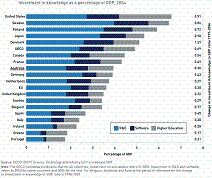|
Knowledge Investment |
A Real and Pernicious Debit |
Education Minister Gillard |
Just on a year ago Kurt Lambeck, as President of the Australian Academy of Science, pointed out in commenting on the 2009-10 federal budget, that while funding for an additional 100 post-doctoral fellowships is highly commended and appreciated, there is still a critical lack of support for mid-career researchers. He also noted that the budget's focus was on material infrastructure; human infrastructure still didn't get a great deal of attention. Support for mid-career researchers is needed to ensure the next generation of university teachers and scientists. "We do need people in the future who can make effective use of the new state-of-the-art facilities [funded by the Super Science initiative]".
With the passing of a year Professor Bob Williamson, Secretary for Science Policy noted: "some apparent deficiencies and little further progress... In last year’s budget, there was a long overdue increase of about 25 per cent in Australia’s research funding, particularly to the universities, but this focused on new buildings and large pieces of equipment. The Academy notes that we still need to attract and retain the best people in science to occupy the labs, run the experiments, and keep Australia at the forefront of world research. Some major initiatives, such as the ‘Australia Fellowships’ in medical research, come to an end this year."
In addition the newly installed Academy president, Professor Susan Cory, said: "A parliamentary inquiry into Australia's international research collaboration will report later this year, and we hope the government will respond with renewed funding for this crucial area, guided by whole-of-government strategy. Currently, valuable programs with long-term international partners are in jeopardy, as forward planning cannot be undertaken. We need a bold vision for the future of research in science, maths and engineering in Australia. This vision is essential for our country's future."
Early in this government's term of office the Minister for Innovation, Industry, Science and Research, Senator Kim Carr, made much of Labor's intention to fully fund research oncosts. Yet Professor Cory, while welcoming the government's decision to ensure that hospitals will now receive essential research funding from the Commonwealth, concludes: "However, it is a pity that there has been no rationalisation of funding to cover real research costs for universities, CSIRO, medical research institutes and hospitals."
And all the while Senator Carr allocates additional resources for forcing the parturition of a counterproductive ERA.
Interestingly, the new UK Minister of State for Science and Universities on first fronting the media said, while referring to the previous government's attempts to morph the peer-reviewed approach of the Research Assessment Exercise (RAE) into a metric based Research Excellence Framework: "We cannot reduce science to an economic balance sheet," and even questioned whether the expensive, time-consuming RAE was the best way to evaluate where funding should go.
Of course Mr Willetts has the reputation of being rather cerebral in his approach to policy.
Which brings us to the Minister for Education/Deputy Prime Minister, Julia Gillard's address to the National Press Club this past Wednesday and raises the question which comes first the egg or the chicken.
So, for example, the opening sentence in this week's Science editorial should be of equal relevance to Australians as it ought to be for Americans: "Great concern has been voiced for at least 30 years about the sad state of U.S. primary and secondary education in mathematics, science, engineering, and technology, but little real progress has been made."
Yet a preening Ms Gillard:
Universities
When schools and early years succeed, so do universities and skilled training.
And we have delivered reform here too, backing the aspiration of Australians
for more opportunities and better paid employment. University-educated workers
earn 40 per cent more than those who completed Year 12 and 70 per cent more than
those who have not completed. (Access Economics, 2005)
Over a working lifetime, a university graduate can expect an income gain of more
than $1.5 million compared to someone whose highest qualification is Year 12.
That is why we have delivered, in two and half years, transformational reform to Australian higher education. We are uncapping places so that participation will be driven by demand. As a result of our reforms, this year university enrolments were a massive 9.9 per cent above the expected number of places. That’s over 44,000 more places.
We have also brought in a new equity payment to encourage universities to enrol talented students from disadvantaged backgrounds. Universities have already responded by increasing their effort to bring in more disadvantaged students. This year offers to low SES applicants increased faster (8.8 per cent) than offers to medium SES (7.8 per cent) or high SES (5.8 per cent) applicants.
Our reforms, coupled with reforms to better target student income support to those who need it most, will open up higher education to a new generation of students. We are also delivering new national regulators for vocational and higher education, to drive high quality across the nation.
Econtech’s modelling shows that if we achieve our goal of 40 per cent of our young people gaining a Bachelor’s degree or higher by 2025, the annual boost per person would be around $775 per person on average over the next thirty years. The estimated gain in jobs is up to 75,000 each year, on average, over the same period. Econtech estimates that reaching the higher education and training targets could generate up to 2.9 per cent more GDP on average to 2040. An additional average annual gain to the economy of around $50 billion, beginning modestly in the earlier years and growing in the later years.
And later in response to a question from The Sydney Morning Herald's Peter Hartcher: "...what can and what will the Labor Government do to implement reform on contested, difficult issues that it hasn’t already done?"
Ms Gillard:
...when I was sworn in as Minister for Education, if I’d said to anybody on that day I’ll get this transparency work done and we’ll have a transparency site like My School before the next election people would have raised an eyebrow. If I’d said we were going to get the curriculum work done, get agreement to it, national curriculum, 30 years of trying, people would have raised the other eyebrow. If I’d said that we would have in this country, before the election, reforms in place like the best teachers being paid to go more to the disadvantaged classrooms that need them the most, the best and brightest coming into teaching through our Teach for Australia program; these things talked about 10, 15 years, never got done, people would have looked at me like that’s not going to happen. If I’d said with my workplace relations hat on we’ll eradicate Work Choices and enact a new system, we’ll get that through a Senate where in order to get a majority we need to do all of the things that we needed to do to have our Bill go through. It wasn’t easy, people would have said well I’m not sure that’s going to get done. If I’d said we’d get occupational heath and safety laws in agreement to uniform laws around the country, 30 years of trying, I don’t reckon people would have said that. When we cleared that agreements at the Workplace Relations Ministerial Council there were public servants who had tears in their eyes because they’d been working on it for 25 years and thought it was never going to happen.
This is, you know, this is a big record of reform and I’m only going to my portfolio areas across Government.
And yet when it comes to renovating the very foundations needed for a "knowledge economy" or more profoundly a true "knowledge milieu" Ms Gillard's, and Senator Carr's score cards are pathetic. They only gain points because of the Coalition's atrocious behaviour toward the sector during the Howard years.
Is it unfair to ask: "Are we witnessing the wilful chronic disintegration of Australia's science and technology intellectual infrastructure?"1, 2

